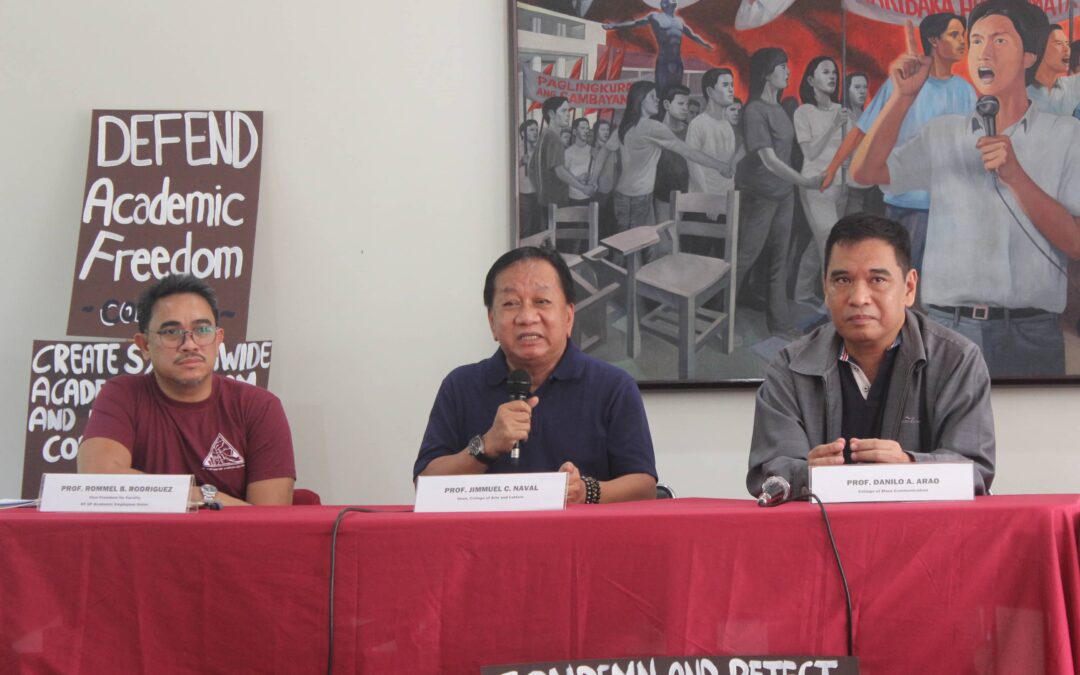The recent cooperation agreement signed on August 8 between the University of the Philippines (UP) and the Armed Forces of the Philippines (AFP) has sparked debate within the UP community. While UP President Angelo Jimenez expressed optimism about the collaboration, several sectors have voiced strong opposition to the pact.
Jimenez addressed concerns raised by critics, asserting that the agreement is consistent with UP’s mandate as the country’s premier institution of higher learning. He explained that the declaration serves as an “initial framework” for future areas of cooperation.
“[It] won’t curtail academic freedom because UP researchers can choose and define their specific terms of engagement. Any activity undertaken shall be mutually agreed upon by both participants,” Jimenez said.
The UP chief explained that the pact is “part of a whole-of-society engagement to help inform public policy, influence thinking, and improve lives through UP’s renowned scholarship.”
He also highlighted similar activities between UP and the police and military in the past, such as the five-year memorandum of agreement between UP Manila and the AFP signed in May 2023, the memorandum of understanding between the UP Diliman College of Engineering and the Philippine National Police Research and Development Center signed in June 2023, and previous engagements between the UP Diliman History Department and the Philippine Veterans Affairs Office when they co-published books on Philippine military history.
According to Jimenez, the University’s think tank, Center for Integrative and Development Studies (CIDS), will lead the latest collaborative effort. “UP CIDS is free to pursue research interests with AFP in areas that are relevant to UP’s role, mission, and mandate.”
“This in itself is an exercise in academic freedom. The only thing required is conformity to the highest standards of academic rigor in the pursuit of truth,” he added.
Under the agreement, UP CIDS will provide technical expertise for forums and workshops, solicit peer-reviewed articles from AFP personnel for its journal, review submissions for the AFP’s Quarterly Digest, disseminate research, conduct capacity-building, and host visits, exchanges, and fellowships with AFP personnel. Both parties have committed to ongoing dialogue and upholding intellectual freedom.
“Our policy is engagement. The national defense establishment as an institution is not an enemy,” Jimenez stated.
He mentioned that AFP Chief of Staff Lt. Gen. Romeo Brawner and Department of National Defense (DND) Secretary Gilberto Teodoro Jr. are both from UP.
Despite these assurances, however, the Defend UP Network and other progressive groups within the University have condemned the agreement. At a press conference held on August 14 at UP Diliman’s Vinzons Hall, leaders from various sectors expressed disappointment with Jimenez’s administration, claiming that it disregarded UP’s longstanding advocacy for human rights and academic freedom.
All UP Academic Employees Union Vice President for Faculty and UP Diliman College of Arts and Letters (CAL) Professor Rommel Rodriguez questioned the intentions behind the agreement, especially since it was allegedly signed without consulting the UP community.
“Kooperasyon ba talaga itó o pakikipagsabwatan? Usapin ba talaga itó ng scholarship o intelligence work? Para ba itó sa interes ng UP community o ng AFP? Para ka ba sa Pamantasan at bayan o para sa lumalabag na karapatan?”
(Is this truly cooperation or collusion? Is this really about scholarship or intelligence work? Is this for the interest of the UP community or the AFP? Are you for the University and the nation, or for those who violate rights?)
Rodriguez presented several reasons why the UP-AFP Declaration of Cooperation should not be accepted, including the lack of consultation with the UP community, the secrecy surrounding the agreement, and the potential risks it poses to academic freedom and safety.
The professor also criticized Jimenez for seemingly prioritizing military interests over the University’s, particularly in light of the administration’s silence on issues like red-tagging.
UP Diliman College of Mass Communication Associate Professor Danilo Arao mirrored Rodriguez’s sentiments. Arao argued that instead of a declaration of cooperation, UP should have focused on restoring the UP-DND Accord and addressing the ongoing issue of red-tagging.
“Tandaan po natin, kasagsagan ng pandemya, unilaterally nag-decide ang DND Secretary noon na si [Delfin] Lorenzana na itigil na itong UP-DND Accord. Bakit tahimik ang UP Administration tungkol dito, at itó pa iyong inatupag? Kinalimutan na yata niya iyon.”
(Let us remember, during the height of the pandemic, then-DND Secretary Delfin Lorenzana unilaterally decided to terminate the UP-DND Accord. Why is the UP Administration silent about this, and instead, focused on this matter? It seems he has forgotten about it.)
Arao further emphasized that the knowledge produced by UP’s research should serve the people, particularly those in marginalized sectors, and not be used for military purposes. He pointed out that many of UP’s memoranda of agreement include provisions ensuring that research products are not weaponized by the military.
“Para saan ba ang ating pananaliksik? Itó ay para sa sambayanan. Itó ay para sa mga nása laylayan sa lipunan. Hindi po itó dapat sa military establishment na posibleng ma-weaponize iyong knowledge production po ng Unibersidad.”
(What is the purpose of our research? It is for the people. It is for those in the margins of society. It should not be for the military establishment, where the University’s knowledge production could potentially be weaponized.)
UP CAL Dean Jimmuel Naval shares his colleagues’ concerns. Naval likened the agreement to the military’s infiltration of campuses during Martial Law.
He warned that the cooperation might enable the military to become too familiar within the University, potentially compromising the academic environment.
“Noong Martial Law, maraming militar ang ipinakalat sa campus. May ibang nagpanggap na jeepney driver para mandikdik sa mga aktibista na dinarakip noong panahon ng Martial Law. Ngayon parang umuulit na naman itó pero sa ibang bíhis,” Naval said.
“Ginagawa táyong pamilyar para hindi na natin pansinin,” he continued.
In a joint statement, the UP Faculty, Staff, and Student Regents expressed grave concerns with the signing of the UP-AFP pact.
“We believe that the UP System Administration has gravely compromised UP’s academic freedom,” they said.
“UP purportedly champions fearless scholarship and critical thinking, but its administration now wants to ‘strategically align [its] resources and expertise’ with a coercive institution that we all know has been accused countless times by local and international human rights watchdog groups of trampling on civil liberties in its purported counterinsurgency campaigns and attacks on government critics and dissidents.”
“The signing of this declaration essentially requires the University to be complicit in human rights violations and political oppression. It also essentially legitimizes the ongoing suppression of critical voices and progressive initiatives within the University that the military deems inimical to its notion of ‘national security.’” — with Rex Espiritu

